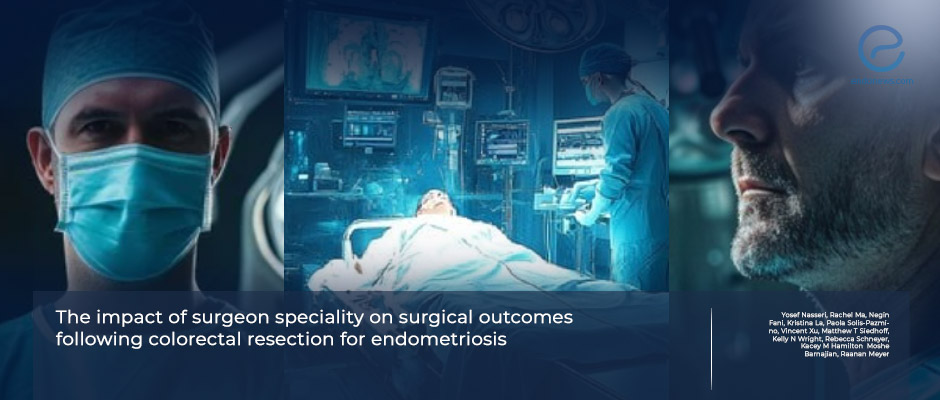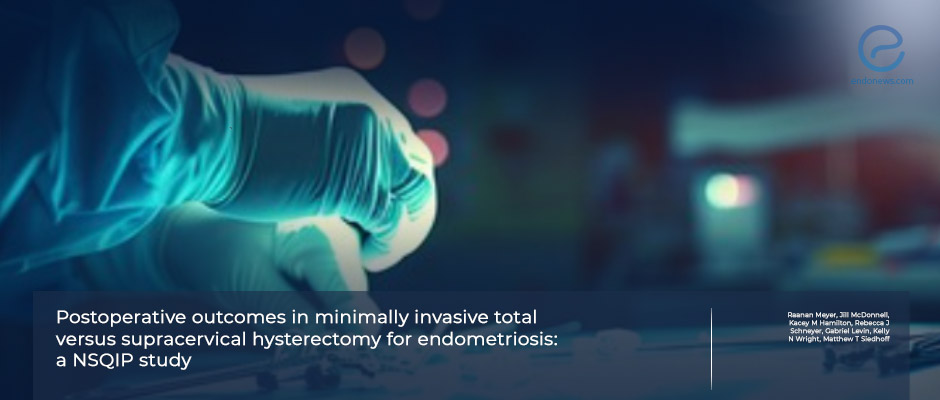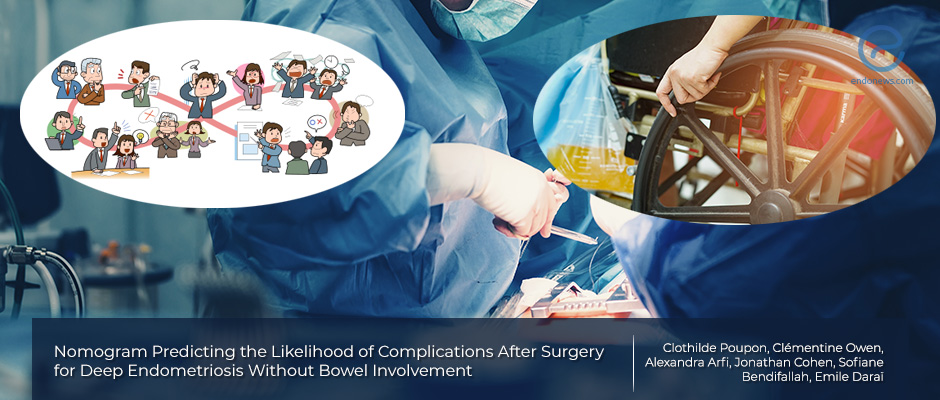The Role of Surgeon Specialty in Colorectal Resection Outcomes for Women with Endometriosis
When endometriosis invade the tissues, including the bowel wall by more than 5 mm, it is termed deep infiltrating endometriosis. Patients with bowel involvement typically experience symptoms such as constipation, diarrhea, tenesmus, and rectal bleeding. Surgical intervention is often the…
Key Points Lay SummaryComparison of Postoperative Complications in Total vs. Supracervical Laparoscopic Hysterectomy for Endometriosis
Dr. Raanan Meyer and his team from Cedars-Sinai Medical Center, Los Angeles, have published a study in Archives of Gynecology and Obstetrics, comparing the outcomes of total laparoscopic hysterectomy (TLH) and laparoscopic supracervical hysterectomy (LSCH) in patients with endometriosis. A…
Key Points Lay SummaryFertility outcomes after discoid excision for colorectal endometriosis.
Colorectal endometriosis is one of the most severe forms of deep endometriosis, composing 85% of all bowel lesions. Radical treatment is segmental resection of the bowels, which can cause postoperative severe complications such as rectovaginal fistula and voiding dysfunctions that negatively…
Key Points Lay SummaryNo increased risk of major postoperative complications in women operated by experienced surgeons in endometriosis centers
Recurrent surgery may be needed in up to 35% of endometriosis patients. The reason for repeated surgery may be residual or recurrent disease. In other words, multiple surgical procedures are a common phenomenon for women having endometriosis. Knowing the impact…
Key Points Lay SummaryA new classification called ENDOGRADE to rate surgical complexity in deep endometriosis.
Correlation with patient outcomes could not be identified in most endometriosis classification systems including the commonly used revised ASRM. Therefore, in addition to grading the depth and invasion pattern of the lesions, there is a need for a classification system to…
Key Points Lay SummaryPostoperative outcomes of laparoscopic rectosigmoid resection for bowel endometriosis.
Rectosigmoid endometriosis comprises 80-85% of all bowel endometriosis cases and can be localized in the rectovaginal septum, uterosacral ligaments, retro-cervical region, and parametrium. Symptoms of rectosigmoid endometriosis include abdominal bloating, constipation-diarrhea, lower-back pain, dyschezia, and sometimes cyclic rectal bleeding. Minimally…
Key Points Lay SummaryPreoperative MRI Scoring System Could Ensure Women Are Fully Informed
The Deep Pelvic Endometriosis Index is able to predict the length of surgery and hospital stay as well as complications following surgery including voiding dysfunction, according to a new multicenter cohort study, the results of which were published in The Journal…
Key Points Lay SummaryHow to predict the complications after laparoscopic bowel resection in women with endometriosis
The endometriotic lesions infiltrating the bowel wall more than 5 mm. are called "deep infiltrating endometriosis". The patients having bowel involvement may have constipation, diarrhea, tenesmus, or rectal bleeding. Surgical management is the main treatment modality to provide benefits on pain, infertility,…
Key Points Lay SummaryFixing holes: prevention and treatment of complications - Jon Einarsson, MD, MPH
Dr. Einarsson shared his operating room video screens during his speech for discussing four major complications (ureter, bladder, bowel, and vascular) of endometriosis surgery and the ways to repair them. Fixing the ureter damage: Endometriotic nodules may settle on the tract…
Key Points Lay SummaryThe advantages of combined vaginal-laparoscopic approach on voiding dysfunction for rectovaginal endometriosis
The patients with rectovaginal endometriotic nodules with extensive vaginal infiltration who are managed combined vaginal-laparoscopic approach have a lower risk of postoperative bladder dysfunction when compared to surgery via laparoscopy alone. This is according to a manuscript published in the…
Key Points Lay SummaryHow to predict complications for endometriosis surgery?
In a new study co-led by scientists at Sorbonne University, a nomogram is built to better inform patients about the risk of deep endometriosis surgery without bowel involvement. The findings have been published in the European Journal of Obstetrics &…
Key Points Lay SummaryHow Could Doctors Reduce Risk of Complications Following Rectal Endometriosis Surgery?
Introducing a temporary opening, known as a stoma, in the abdomen of patients that are operated for rectal endometriosis to collect waste products could reduce the risk of complications such as anastomotic leakage. This is according to a study by…
Key Points Lay Summary
 By Hale Goksever Celik
By Hale Goksever Celik

 By Nasuhi Engin Aydin
By Nasuhi Engin Aydin

 By Selma Oransay
By Selma Oransay




 By Özge Özkaya
By Özge Özkaya



 By Irem Onur
By Irem Onur

 By Timur Seckin
By Timur Seckin
